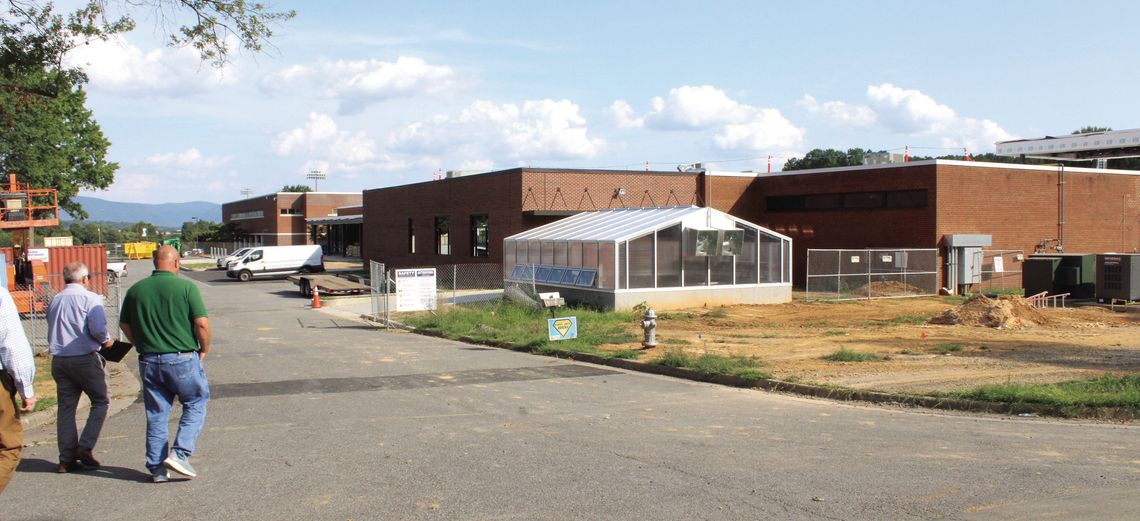Board Tours Worksite
With power newly provided to the building, and renovations just a few months away from completion, the new Rockbridge Innovation Center was the site of a tour by the Rockbridge County School Board Aug. 15, who wanted to see the changes and additions that have been made to what was formerly known as the Floyd S. Kay Vocational Center.
Before they got there, they took a look at the brand new school transportation office, recently built and located just across the street.
The group looked into the new offices, meeting room, kitchen, bathrooms and break room that make up the cozy, clean building, as Superintendent Phillip Thompson explained the benefit of the transportation department having its own space.
“Transportation is kind of like the unwanted stepchild in the district, having been moved from building to building. It’s great that they’ll have this new office to live in now,” he said.
A few minutes later, across the street, the main event began, a walkthrough of the huge Innovation Center building, which is being expanded and renovated from the old F.S. Kay Center. Dominion had recently turned on the power to the building, which allowed for proper ventilation, making possible the final stretch of construction, as well as the tour.
The Board members entered the front doors, pausing in the entryway as Thompson gestured at the wall. Here he imagined an “honor wall” being put up, meant to recognize the efforts of Kay, the county schools superintendent who started the process in the 1960s that led to the opening of the vocational center in 1976.
The tour that followed was of a succession of rooms and halls, each section specially designed to house instruction in a particular career field. Thompson confirmed that construction is to be completed on schedule, in December, with the facility ready to open in time for the first semester of 2025.
The culinary arts facilities were just outfitted the prior week with new ovens and equipment, expanding the department from two kitchens, in the old building, to four in the new. “I just talked to Corey [Wallace, culinary arts instructor] yesterday,” said School Board member Kathy Burant. “He is so excited!”
Next to the kitchen was a serving room complete with a roll-up garage door, where students will serve lunch to their classmates, faculty and staff.
The nurse aide classroom featured a large door to a concrete slab outside, the future location of a SimRig — a mockup ambulance trailer that will be set up exactly like modern ambulances. Here, students will be able to train with simulated EMT scenarios.
Occasionally, Board members commented on the status of the floors. They recognized some terrazzo from the old building, and Thompson pointed out the durability of the material.
“I don’t want sheet rock in a place where it’s going to get torn up,” he said. “You see a lot of cinderblock and tile work around here; it’s made with the idea of durability and letting the building last, hopefully for another 15 years at least.”
Some of the floor has required extra attention, especially in rooms where the intended activity is different from what it was previously.
“You remember a lot of these floors — these were the old shops that had the drains and the floors sloped to go down to a drain. You don’t want that if you’re going to have desks,” Thompson explained, pointing to areas where leveling compound had been applied so floors don’t end up slanted.
Throughout the tour, Thompson drew attention to the fact that most of the classrooms have large glass windows looking in. The planners were guided by a philosophy of openness, he said, wanting students, staff and visitors to be able to see what’s going on in any given room from the outside.
One unassuming room was identified as what will be the “community room.” “This is where we’ll put a little bit of lipstick in the building,” said Thompson. “A couple of big monitors [will be] on the wall, and it can be a gathering space. If we want to have a meeting, we can have it in here.”
There was a classroom for small animal care, with washing stations and pet grooming stations. In the back was a small kennel. Students will be able to learn how to care for cats, dogs, rabbits, and other small animals, some of which will be brought in by the public.
One area that has received a huge upgrade is the agricultural lab. Where previously the classroom area had to fi t w ithin t he a rea o f t he lab (which was “makeshift at best,” according to Thompson), now there are two separate areas, one for instruction and one for hands-on agricultural work. That’s not to mention the brand-new greenhouse, outfitted with weather-sensing equipment, and an outdoor area that will feature raised beds for planting. Thompson praised the agricultural instructors, who have been “extremely involved in seeing that this is what [they] want.”
Moving into the auto tech lab, Thompson once again drew attention to the work that has gone into the new f looring. Here, imperfections and damage have been ground down, polished and sealed. “You can spill oil on it and it’ll clean up much easier than if it were to soak into porous concrete that didn’t have this treatment,” he explained.
The auto tech lab, which has its own area distinct from the auto body lab, will feature a new air compression system, something the old lab lacked. Administrators sought advice for the air system from J.D. Goad, who also donated a framing machine to the auto body lab. Both areas of automobile maintenance boast large, shiny equipment alongside the well-used machinery that’s still in good shape.
The most noticeable change from the previous facilities was an enormous outdoor roofing structure, over two stories tall, near the back of the main building. This is meant for house construction, and it’ll allow students to work consistently on projects without having to worry about the impact of inclement weather.
It will be the site of one of the center’s most recognized projects, the building of a house for Habitat for Humanity. With the new structure in place, the house can now be built on a trailer, to be pulled away by a truck, as opposed to needing a crane to come and pick it up to load it out.
Back inside, the Board looked at the new welding lab, which was outfitted with eight individual booths. Up to eight students will be able to weld simultaneously, protected by fireproof curtains and ventilation tubes that will carry fumes and harmful particles safely away from workspaces.
Burant mentioned her disorientation upon realizing she couldn’t tell which parts are from the old building and which parts are new. “I am way turned around!” she remarked. “This is amazing!”
The group got reoriented as it came to the end of the tour, on the inside edge of a fence that rounds the back of the building, near several garages. Thompson pointed out the last feature, a generator on the edge of the property that will guarantee power continually runs, even during an outage, to “all the important things: server rooms, some computers, that sort of thing, so we can stay mostly up and running in an emergency.”
To stay running, no matter the situation, is a goal that has permeated this project throughout. In view of the tour group, behind the new house-building roof structure, could be seen one of the large white tents that continue to house classes as the renovation nears completion. It made for a fitting contrast with the new facility.
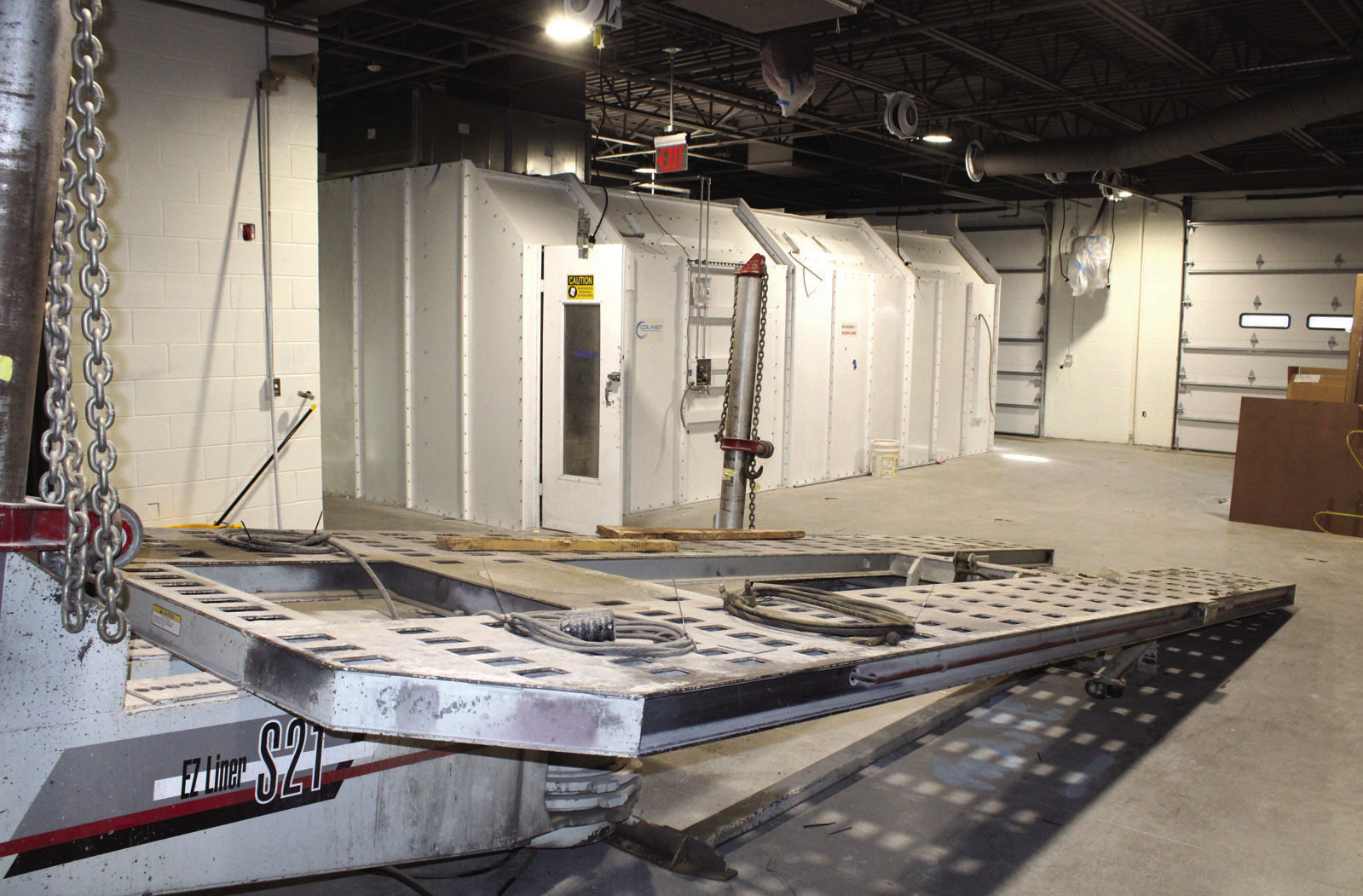
THE AUTO BODY shop inside the Rockbridge Innovation Center features a new frame machine, for repairs, as well as an automotive paint booth. (Scotty Dransfield photo)
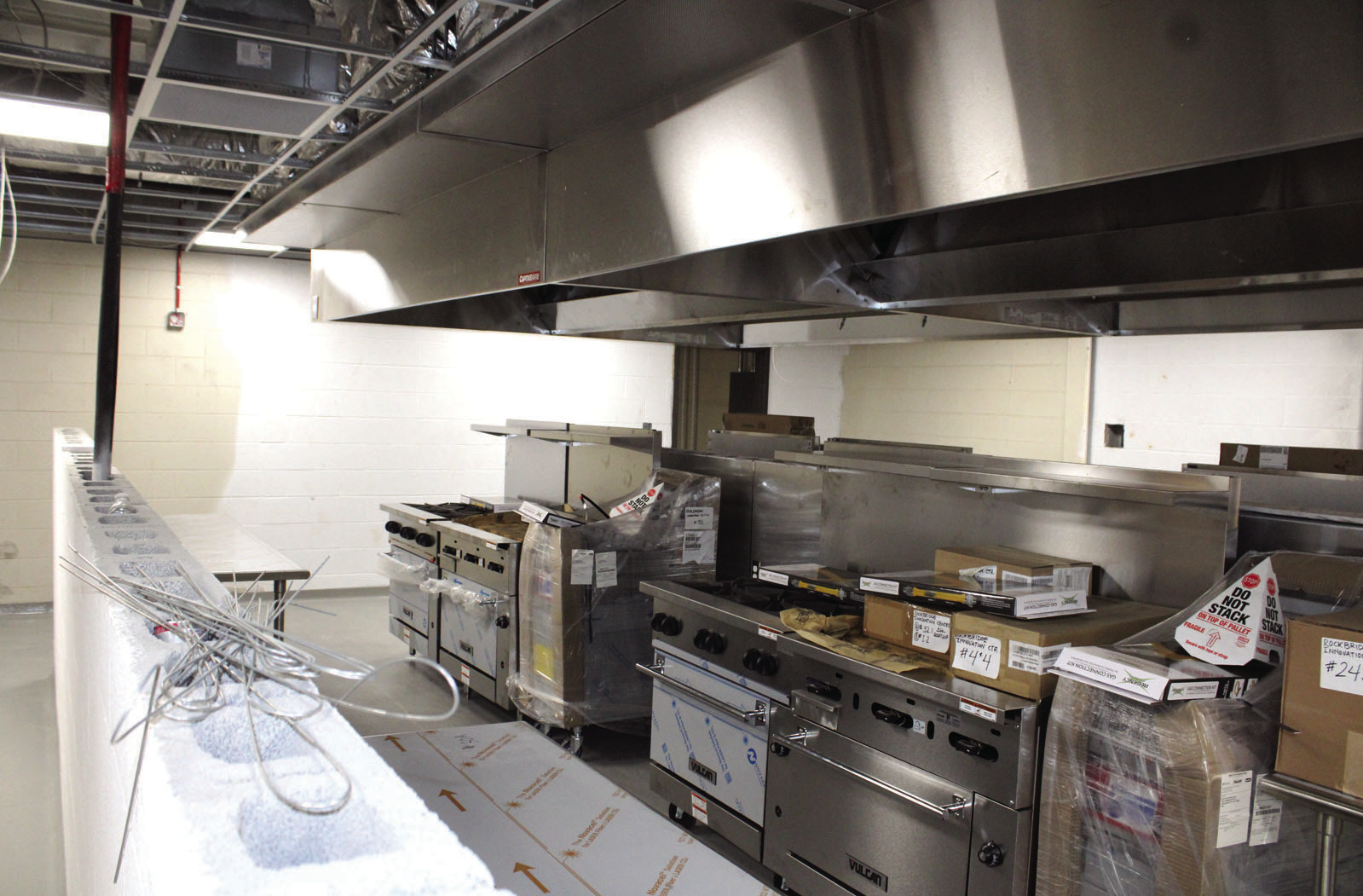
THE CULINARY arts section of the Innovation Center boasts four kitchens with brand new equipment. (Scotty Dransfield photo)
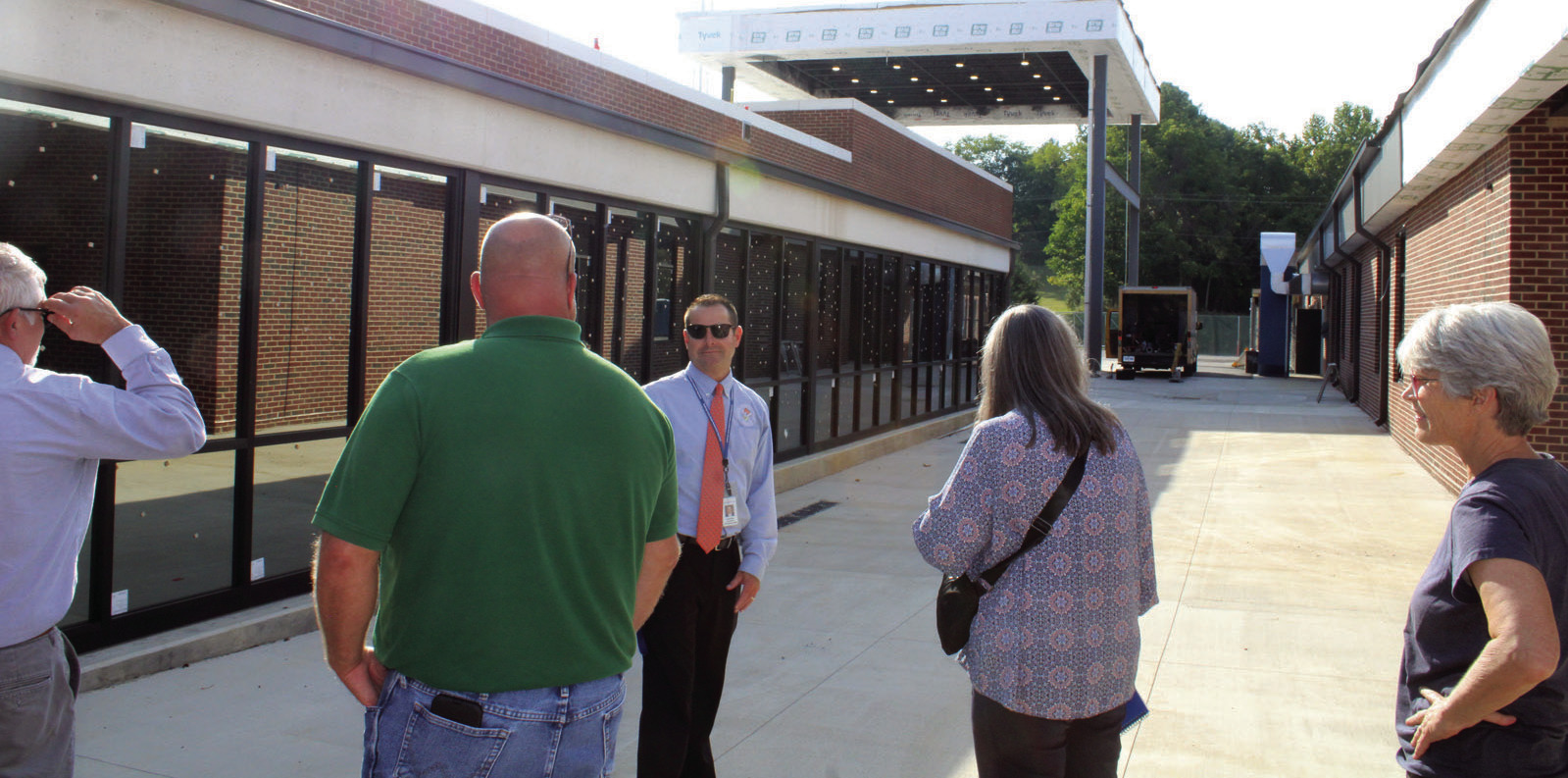
SCHOOL BOARD members tour the periphery of the Innovation Center, in view of the new roofing structure that will protect house-building students from the weather. (Scotty Dransfield photo)
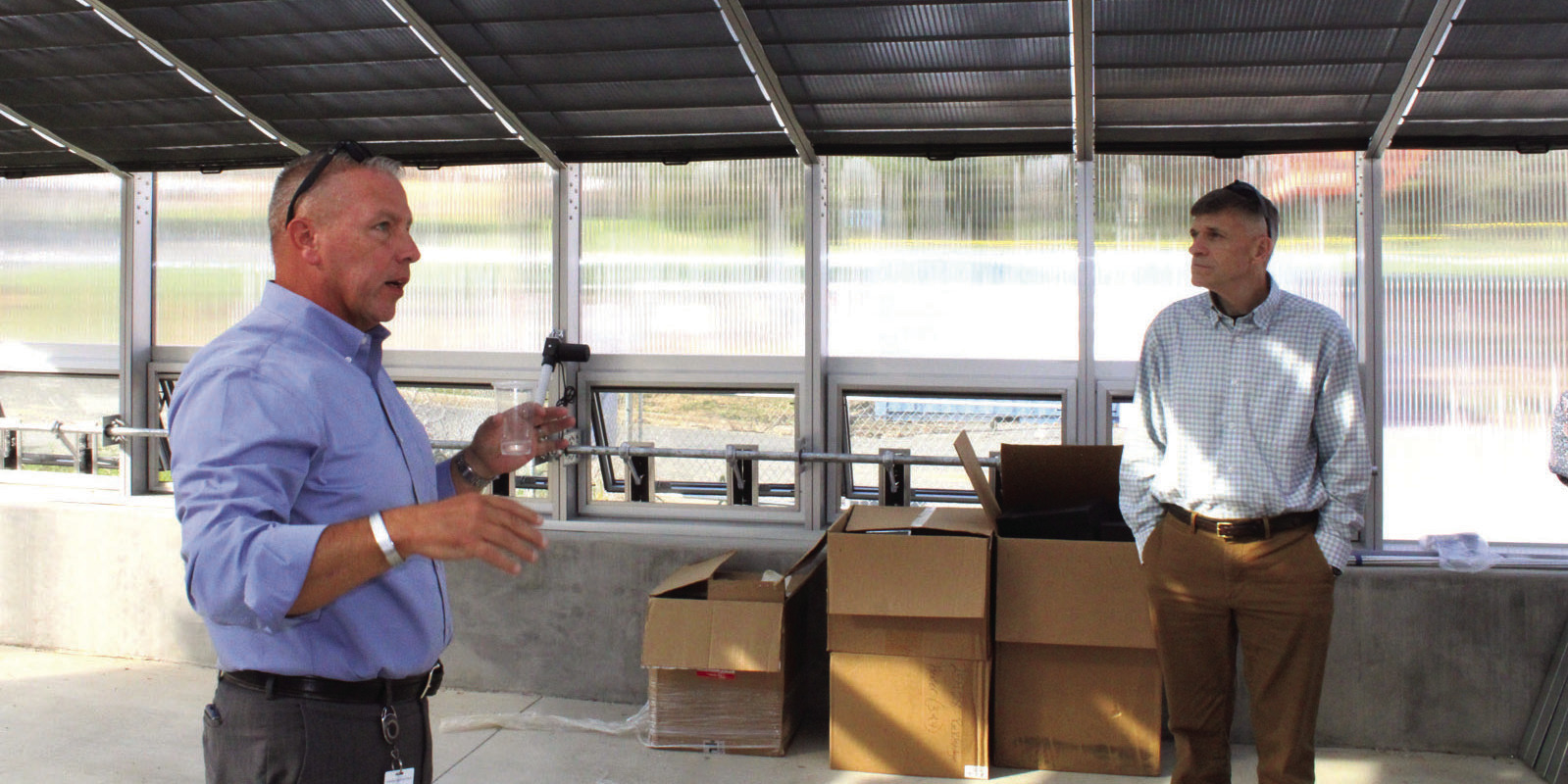
PHILLIP THOMPSON, superintendent, shows off the new greenhouse. The outside of the greenhouse can also be seen in the front page photo. (Scotty Dransfield photo)

